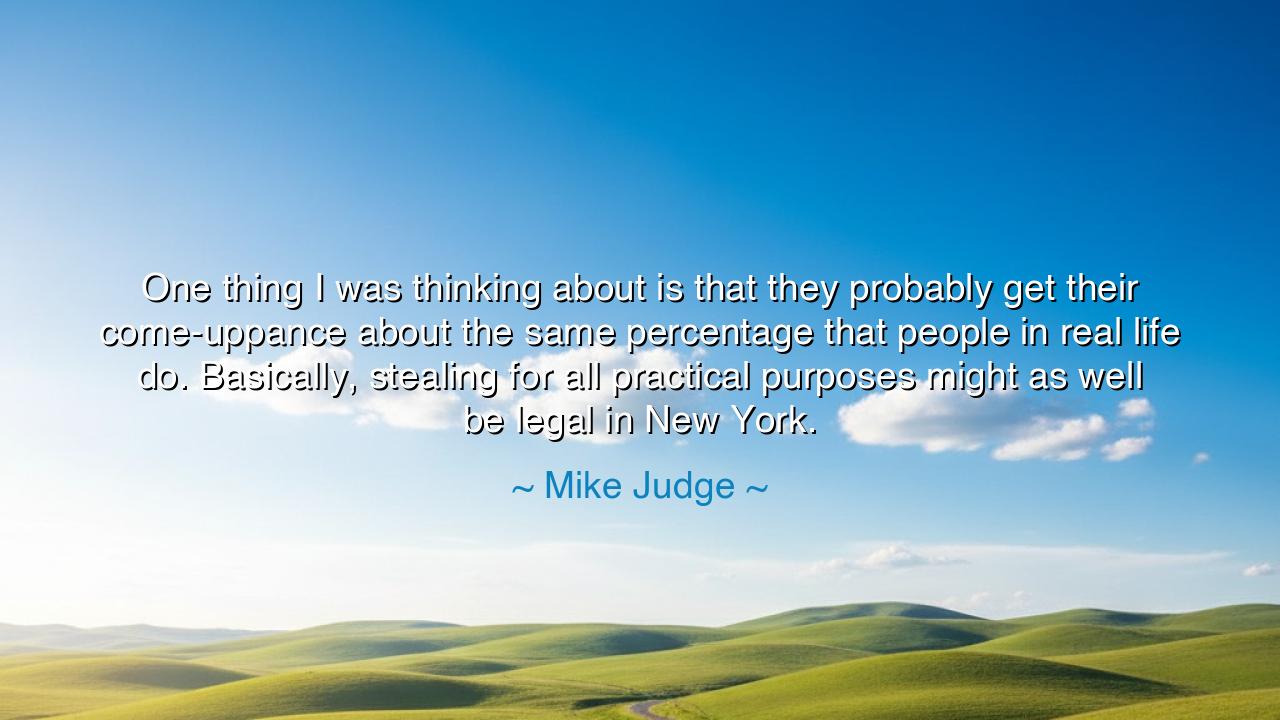
One thing I was thinking about is that they probably get their
One thing I was thinking about is that they probably get their come-uppance about the same percentage that people in real life do. Basically, stealing for all practical purposes might as well be legal in New York.






Hear now the sharp words of Mike Judge, a satirist of American life, who often cloaks deep truth beneath the veil of humor: “One thing I was thinking about is that they probably get their come-uppance about the same percentage that people in real life do. Basically, stealing for all practical purposes might as well be legal in New York.” These words sting, for they are not only a jest but a mirror held up to society. They reveal a grim truth: that injustice often goes unpunished, that the corrupt thrive while the honest suffer, and that the balance of justice tilts far too easily in favor of the cunning and powerful.
When Judge speaks of come-uppance, he means the day of reckoning, the hour when the thief or the oppressor is brought low for his deeds. Yet he notes that this happens no more often in fiction than in reality—that life itself too rarely delivers the punishment due. Thus, the crooked man may walk proudly in his ill-gotten wealth, while the poor, robbed and cheated, are left with little recourse. The words strike like a prophet’s lament, pointing to a system that fails its people, a justice that is sluggish when it should be swift.
The biting phrase “stealing… might as well be legal in New York” is not to be read as literal law, but as the cry of frustration from one who sees theft—whether by pickpockets on the street or by corporations in high towers—flourish without true consequence. It is the recognition that a city, magnificent in its grandeur, may also be rife with impunity, where wrongdoers slip between the cracks of law enforcement, or worse, wield influence so great that the law itself bows before them.
History offers many lessons of such truth. Consider the era of Tammany Hall in nineteenth-century New York, where political bosses like William “Boss” Tweed plundered the city’s coffers. It was said that Tweed and his ring stole millions from the people, funneling money through false contracts and inflated bills. For years he prospered, even celebrated by some, while the citizens bore the cost. Only when the scandal grew too vast to ignore did he fall. But the lesson remains: the thief may sit in a palace as easily as in a dark alley, and the law is often slow to touch him.
The meaning of Judge’s words is both satirical and sorrowful: that in many places, injustice wears the clothes of legality. What is theft when it comes from the hands of the rich? What is fraud when it is shielded by contracts and lawyers? In such a world, the people learn a dangerous lesson—that the game is rigged, that morality is powerless against money, and that punishment is rare. This corrodes not only the trust in law, but also the spirit of a people, who begin to doubt whether fairness is possible at all.
Yet his words also carry a hidden call to action. For if reality does not always deliver come-uppance, then it falls to the people to demand it, to build systems of accountability, and to strengthen laws that protect the vulnerable. Justice must not be left to chance, nor entrusted to those who profit from its absence. It must be pursued with vigilance, as the farmer guards his field, as the shepherd watches his flock.
Children of tomorrow, let this lesson burn in your hearts: do not accept the falsehood that corruption is inevitable or theft unpunishable. Demand integrity in leaders, transparency in institutions, and honesty in your own dealings. Support those who fight for reform, and do not remain silent when you see injustice. Even small acts of courage—exposing dishonesty, standing up for the cheated, refusing to profit from deceit—are seeds of change that may one day grow into mighty trees of justice.
And so, the wisdom of Mike Judge’s words endures: that stealing without consequence is a poison to society, and that waiting for “come-uppance” is not enough. The people must become the guardians of fairness, the builders of accountability, and the heralds of justice. Only then will cities, great and small, stand not as havens for thieves, but as sanctuaries of trust, where honesty is honored and corruption is no longer cloaked in power.






AAdministratorAdministrator
Welcome, honored guests. Please leave a comment, we will respond soon